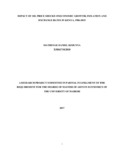| dc.description.abstract | Crude oil is a critical resource in not only fueling the economic activities but also as a key input to large proportion of commodity production. Global factors such as wars, population increase, broadening of manufacturing and commodity market have continuously exerted pressure and volatility on crude oil prices over the last three decades. Studies have shown that changes in crude oil prices have significant impacts on economic performance depending on oil and development status as well as policy environment of a country. In Kenya, the last three decades have seen several oil price shocks, changes in monetary policy environment, inflation, volatility of exchange rate and fluctuating economic growth. This research work aimed at examining the impact of oil price shocks on inflation, exchange rates and economic growth. Data was obtained from the KNBS and World Bank sources. Normality tests revealed that the variables had met the required condition ofr normality i.e skewness of zero and kurtosis of three. Augmented Dickey Fuller (ADF) and Philip Perron tests revealed unit roots for all the variables which became stationary after taking first difference. Cointegration tests revealed existence of atmost one cointegrating equation thus VECM was fitted. The study core hypothesis was to assess whether crude oil price shocks has significant impacts on economic growth, inflation rate and exchange rate. The shortrun casuality obtained from the the coefficient of the first difference of the VECM model for two lags revealed that the impact of oil shocks is significantly different from zero in the first and second lag of real GDP growth and significant from zero for lag one of real exchange rate and inflation. However, for interest rates and M2, as well as lag 2 for echange rate and inflation, the impact of oil price shock is not significantly different from zero. Further, the results showed that crude oil, interest rates and M2 have insignificant longrun adjustment to equilibrium. On the other hand, the EC term for GDP, real exchange rates and Inflation are significantly negative which implies a longrun associationship is achieved as the errors tend to disappear in each time lag drawing these variables to longrun equilibrium.Post estimation tests on the VECM were used to determine the robustness of the model. The results showed that the residuals were normally distributed, no autocorrelation and modulus of eigen values was less than unity meaning the model met stability condition. The movement of interest rate is not responsive enough to reduce the effects of oil price changes in Kenya economy. The long run changes and error correction comes from economic growth, inflation and exchange rates. However, the growth is not fast enough to clear the effects of oil price shocks both in the shortrun and longrun.This study recommends for policy mix in both monetary, fiscal and trade policy to holistically reduce improve economic growth and accelerate the fading out of the effects of oil price shocks. This will happen through lowering of interest rates, tax adjustments and relaxing constraints in alternative energy sources such as electricity to cushion investments from effects of crude oil prices. Areas suggested for future studies include effects of interest rates on actual oil consumption and real GDP; analysis on effects of crude oil on other macroeconomic variables such as stock market prices, unemployment and sectoral performances should be carried out to bring out a holistic understanding of the impacts of crude oil in Kenyan economy, and; study on the same variables in this study using different lags, panel data and comparison of Kenya resilience to crude oil against countries with similar economic characteristic in order to draw hybrid policy recommendation. | en_US |



